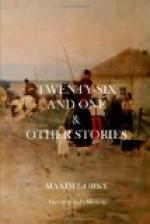“Miserable prisoners!”
And she came directly toward us, she walked, too, as though we were not in front of her, as though we were not in her way. Therefore none of us were in her way, and coming out of our circle, without turning to us, she said aloud, and with indescribable contempt:
“Rascals! . . . Rabble!” . . .
Then she went away.
We remained standing in the centre of the yard, in the mud, under the rain and the gray, sunless sky. . . .
Then we all went back silently to our damp, stony ditch. As before, the sun never peeped in through our windows, and Tanya never came there again! . . . .
Tchelkache
The sky is clouded by the dark smoke rising from the harbor. The ardent sun gazes at the green sea through a thin veil. It is unable to see its reflection in the water so agitated is the latter by the oars, the steamer screws and the sharp keels of the Turkish feluccas, or sail boats, that plough the narrow harbor in every direction. The waves imprisoned by stone walls, crushed under the enormous weights that they carry, beat against the sides of the vessels and the quays; beat and murmur, foaming and muddy.
The noise of chains, the rolling of wagons laden with merchandise, the metallic groan of iron falling on the pavements, the creaking of windlasses, the whistling of steamboats, now in piercing shrieks, now in muffled roars, the cries of haulers, sailors and custom-house officers—all these diverse sounds blend in a single tone, that of work, and vibrate and linger in the air as though they feared to rise and disappear. And still the earth continues to give forth new sounds; heavy, rumbling, they set in motion everything about them, or, piercing, rend the hot and smoky air.
Stone, iron, wood, vessels and men, all, breathe forth a furious and passionate hymn to the god of Traffic. But the voices of the men, scarcely distinguishable, appear feeble and ridiculous, as do also the men, in the midst of all this tumult. Covered with grimy rags, bent under their burdens, they move through clouds of dust in the hot and noisy atmosphere, dwarfed to insignificance beside the colossal iron structures, mountains of merchandise, noisy wagons and all the other things that they have themselves created. Their own handiwork has reduced them to subjection and robbed them of their personality.
The giant vessels, at anchor, shriek, or sigh deeply, and in each sound there is, as it were, an ironical contempt for the men who crawl over their decks and fill their sides with the products of a slaved toil. The long files of ’longshoremen are painfully absurd; they carry huge loads of corn on their shoulders and deposit them in the iron holds of the vessels so that they may earn a few pounds of bread to put in their famished stomachs. The men, in rags, covered with perspiration, are stupefied by fatigue, noise and heat; the machines, shining, strong and impassive, made by the hands of these men, are not, however, moved by steam, but by the muscles and blood of their creators—cold and cruel irony!




